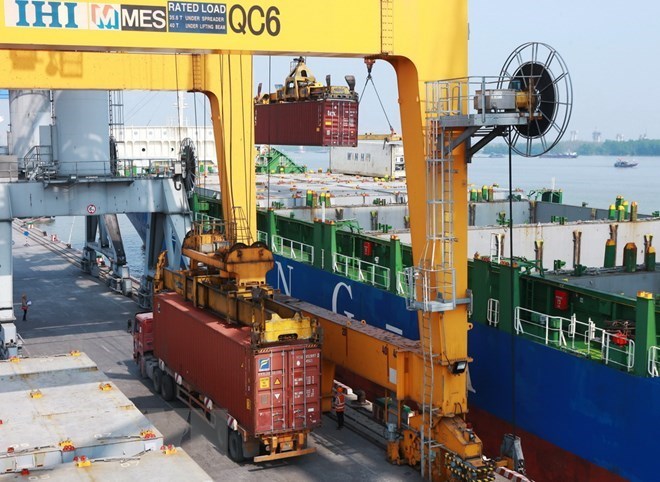
Vietnam’s economy grew at a fast pace in the first half of 2018 compared to the previous years, but there are indications that it is losing momentum – a problem not only in the last half of the year but also in 2019 and 2020.
Containers are loaded at Tan Vu Port of Hai Phong Port in Hai Phong city (Photo: VNA).
The remark was made by Dang Duc Anh, head of the analysis and
forecast section of the National Centre for Socio-economic Information and
Forecast (NCIF), at a discussion in Hanoi on August 8.
The growth rate reached 7.45 percent in the first quarter and
6.79 percent in the second quarter, but it is predicted to slow down to 6.72
percent during July-September and 6.56 percent in the last three months.
Meanwhile, average inflation is likely to be around 4 – 4.2 percent, according
to the NCIF.
Despite the 7.08-percent growth in the first six months,
there are many challenges during the rest of the year, including pressure from
the appreciation of the US dollar due to the possibility that the US Federal
Reserve could hike interest rates twice from now to the year’s end.
Resources for economic growth in the coming months are
unclear while the processing and manufacturing industry – a major driving force
– is depending on FDI firms and still at a low level in value chains. The
driving force from the FDI sector, which is becoming saturated in Vietnam, is
also reducing. Additionally, effects of business climate improvement policies
haven’t been clearly seen, he added.
Other challenges include impacts of the US-China trade war.
Echoing his view, other experts said the US-China trade
tension could lead to a domino effect on Vietnam’s economy.
Tran Toan Thang, head of the NCIF’s world economy section,
said the trade war, geopolitical risks and the US’s taxation policy reforms will
affect investment decision of multi-national American companies. The reduction
of corporate income tax in the US may also trigger a wave of tax cut or more
investment incentives in some countries to keep US businesses, which could
impact the competitiveness of Vietnam’s investment environment.
To maintain the growth momentum for the coming time, Vietnam
should create a more transparent investment climate, improve technological
capacity to attract more FDI companies, and actively respond to the US-China trade
war’s impacts and exchange rate changes.
Meanwhile, Luu Bich Ho, former Director of the Vietnam
Institute for Development Strategies at the Ministry of Planning and
Investment, said the country needs to press on with developing processing and
manufacturing and pay more attention to seeking export markets.
He noted amid US-China trade tensions, it is necessary to
prevent Chinese goods from taking advantage of the Vietnamese market to falsify
their origin to export to the US, or Vietnam could be taxed in a way China has
been.
Source: VNA
Dao Village’s honey – a product certified with a 3-star OCOP (One Commune One Product) rating by Thong Nhat Agricultural Cooperative in Dao Village (Hoa Binh City) – is highly regarded by consumers for its quality, richness, and variety in packaging. The distinctively sweet taste of Dao Village’s honey leaves a lasting impression on anyone who has tried it.
In alignment with Project No. 07-DA/TU, issued by the Hoa Binh provincial Party Committee on November 1, 2021, Lac Thuy district has actively promoted investment and supported the sustainable development of its industrial and handicraft sectors during the 2021–2025 period. Alongside this, the district has remained committed to preserving and revitalising traditional craft villages.
Located in the northern part of Lac Thuy district, with a temperate climate and fertile soil, Phu Thanh commune has great potential and advantages in growing tea. The long-standing experience, combined with strict adherence to organic farming practices in the tea gardens, ensures that the dried tea products from Phu Thanh and Lac Thuy as a whole are sold out immediately upon production, providing a stable and prosperous life for the local people.
Amid efforts to streamline the administrative apparatus, Hoa Binh province has intensified measures to address challenges in land clearance, resettlement support, and infrastructure investment, aiming to speed up the progress of key projects.
Hoa Binh province has posted an unprecedented economic growth rate of 12.76% in the first quarter of 2025, marking its highest quarterly performance to date and positioning it as the second fastest-growing locality in the country, trailing only Bac Giang province.
Under current regulations, products in the One Commune – One Product (OCOP) programme that are rated three stars or higher must undergo re-evaluation every three months. However, in reality, some of these products fail to consistently meet the required standards, raising concerns about the sustainability of their OCOP certification. This underscores the urgent need for producers to enhance product quality and gradually develop their OCOP products into strong, marketable brands.



